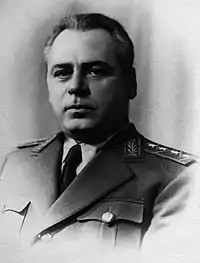Vsevolod Merkulov
Vsevolod Nikolayevich (Boris) Merkulov (Russian: Всеволод Николаевич Меркулов; 27 November [O.S. 25 October] 1895 – 23 December 1953) was the head of NKGB from February to July 1941, and again from April 1943 to March 1946. He was a member of the so-called "Georgian mafia" of Lavrentiy Beria, head of the NKVD.

Life and career
Merkulov was born in 1895 at Zagatala in Tiflis Governorate (present-day Azerbaijan). In 1913, he graduated from the Tiflis Gymnasium with a gold medal and became a student at Saint Petersburg University, Department of Physics and Mathematics. From 1921-1922, he worked as a detective at the Transportation Unit of the Cheka in Georgia. From 1925 to 1931, Merkulov held the posts of Head of Secret Operations Directorate and Deputy Head of GPU of Adzharistan.
Merkulov was People's Commissar of State Security of the USSR from 3 February 1941 until 20 July 1941, when the NKGB again fell under control of the NKVD as GUGB. From 1941 to 1943, Merkulov was Deputy People's Commissar of the NKVD. In 1943, the GUGB was again separated from the NKVD, and Merkulov became head of the NKGB from 20 July 1943 until 1946.
Vsevolod Merkulov was involved with a plan to build up a network of spies inside the Manhattan Project. The NKVD's first success was the recruitment of Klaus Fuchs. The project was given the codename "Enormoz". [1] In November 1944, Pavel Fitin reported: "Despite participation by a large number of scientific organization and workers on the problem of Enormoz in the U.S., mainly known to us by agent data, their cultivation develops poorly. Therefore, the major part of data on the U.S. comes from the station in England. On the basis of information from London station, Moscow Center more than once sent to the New York station a work orientation and sent a ready agent, too (Klaus Fuchs)." [2]
Another important source was John Cairncross. Fitin reported to Merkulov: "Valuable information on Enormoz is coming from the London station. The first materials on Enormoz were received in late 1941 from our source List (John Cairncross), containing valuable and absolutely secret documents both on the substance of the Enormoz problem and on measures by the British government to organize and develop work on the problem of atomic energy in our country. In connection with American and Canadian work on Enormoz, materials describing the state and progress of work in three countries - England, the U.S., and Canada - are all coming from the London station."[3]
He briefly served as Minister of the MGB in 1946, but was soon replaced by his rival Viktor Abakumov. Merkulov later served as Minister of State Control, replacing Lev Mekhlis. Following Stalin's death, he was arrested and executed by firing squad along with his patron Beria and five other associates on 23 December 1953. It is rumored that all six bodies were cremated and buried in an unknown location near Moscow.
Merkulov may be best known for a letter he wrote to his boss, Lavrentiy Beria, on 2 October 1944 regarding the cooperation the Soviet Union had received from a top scientist in the United States' program to develop an atomic bomb.
The author, Nikolai Tolstoy, in his Victims of Yalta (1977), recounts Merkulov speaking to the imprisoned Cossack general Pyotr Krasnov in the Lubyanka in 1945. (The report is the testimony of the general's son, Nikolai Krasnov, who was also present and later released from the Gulag under Nikita Khrushchev's 1955 amnesty.)
"Sooner or later there will be a clash between the Communist Bear and the Western Bulldog. There will be no mercy for our sugar-coated, honey-dripping, wheedling, grovelling allies! We'll blow them to blazes with all their kings, with all their traditions, lords, castles, heralds, Orders of the Bath and Garter, and their white wigs. When the Bear's paw strikes, no-one will remain to nurse the hope that their gold can rule the world. Our healthy, socially strong young idea, the idea of Lenin and Stalin, will be the victor! (...) When we roar they sit tight on their tails! I am told that there were Tsars who watered their horses in the [River] Oder. Well, the time will come when we will water Soviet horses in the Thames!"[4]
References
- "Vsevolod Merkulov". Spartacus Educational.
- Pavel Fitin, report on the Manhattan Project (5 November 1944)
- Pavel Fitin report to Vsevolod Merkulov (August 1945)
- N. Tolstoy, Victims of Yalta, Hodder & Stoughton 1979 edition, pp.241-2
Further reading
- Nation, R. C. (2018). Black Earth, Red Star: A History of Soviet Security Policy, 1917-1991. Ithaca, NY: Cornell University Press.[1][2]
- Katz, Mark N. (1994). "Black Earth, Red Star: A History of Soviet Security Policy, 1917-1991. By R. Craig Nation. Ithaca: Cornell University Press, 1991". Slavic Review. 53 (2): 610. doi:10.2307/2501355. JSTOR 2501355.
- Kaufman, Stuart (1993). "Reviewed work: Black Earth, Red Star: A History of Soviet Security Policy, 1917-1991, R. Craig Nation". Russian History. 20 (1/4): 377–378. doi:10.1163/187633193X00847. JSTOR 24657366.
